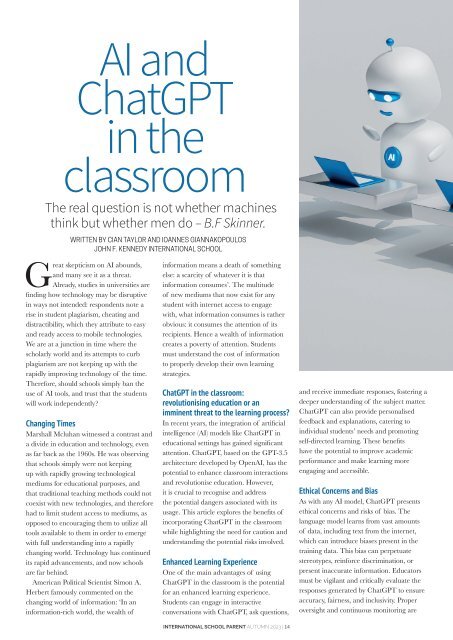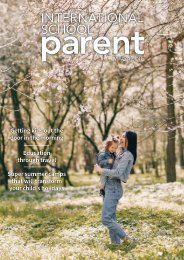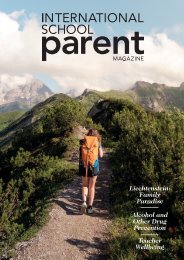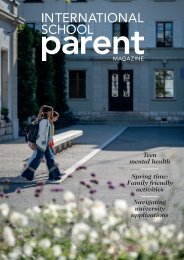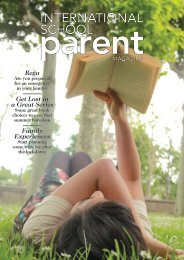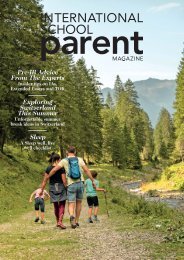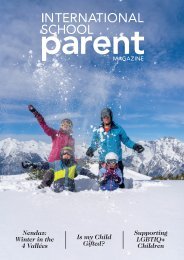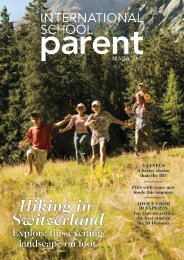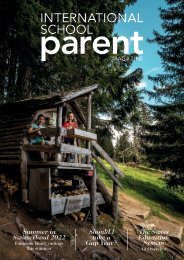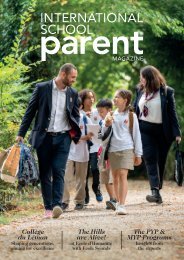International School Parent Magazine - Autumn 2023
Welcome to the Autumn Edition of International School Parent Magazine! Autumn is such a busy time – school is back in full swing, and Christmas seems to be right around the corner. As the leaves slowly start to change, we look forward to the cosy winter months, while our schools in the southern hemisphere look towards long summer days and warmer weather. Once again, we are thrilled to present to you a magazine filled with interesting and informative articles, exciting experiences, and practical tips for parents. The Autumn/Winter edition of International School Parent Magazine 2023 explores topical themes such as AI, and highlights some of the amazing initiatives led by schools in our community. We had the pleasure of interviewing Dr. Conrad Hughes, Director General of Ecole Internationale de Genève (Ecolint). In this piece, Conrad shares his passion for education and provides an insightful glimpse of Ecolint’s vision for education in the future. We also continue our discussion of children’s mental health, the impact of AI on our LGBTQI+ community, the importance of lifesaving first aid skills for children, and present many more interesting articles and commentary. Autumn is a wonderful time to enjoy the outdoors. Check out the article about the diverse activities on offer in Switzerland, special resources for children in the Zurich area, and learn about the stunning landscape of Interlaken. We remain committed to helping parents and children make the most of their international school experience. Have a wonderful autumn/winter period and we look forward to bringing you more content again in the spring.
Welcome to the Autumn Edition of International School Parent Magazine!
Autumn is such a busy time – school is back in full swing, and Christmas seems to be right around the corner. As the leaves slowly start to change, we look forward to the cosy winter months, while our schools in the southern hemisphere look towards long summer days and warmer weather. Once again, we are thrilled to present to you a magazine filled with interesting and informative articles, exciting experiences, and practical tips for parents.
The Autumn/Winter edition of International School Parent Magazine 2023 explores topical themes such as AI, and highlights some of the
amazing initiatives led by schools in our community. We had the pleasure of interviewing Dr. Conrad Hughes, Director General of Ecole Internationale de Genève (Ecolint). In this piece, Conrad shares his passion for education and provides an insightful glimpse of Ecolint’s vision for education in the future.
We also continue our discussion of children’s mental health, the impact of AI on our LGBTQI+ community, the importance of lifesaving
first aid skills for children, and present many more interesting articles and commentary. Autumn is a wonderful time to enjoy the outdoors. Check out the article about the diverse activities on offer in Switzerland, special resources for children in the Zurich area, and learn about the stunning landscape of Interlaken.
We remain committed to helping parents and children make the most of their international school experience. Have a wonderful autumn/winter period and we look forward to bringing you more content again in the spring.
You also want an ePaper? Increase the reach of your titles
YUMPU automatically turns print PDFs into web optimized ePapers that Google loves.
AI and<br />
ChatGPT<br />
in the<br />
classroom<br />
The real question is not whether machines<br />
think but whether men do – B.F Skinner.<br />
WRITTEN BY CIAN TAYLOR AND IOANNES GIANNAKOPOULOS<br />
JOHN F. KENNEDY INTERNATIONAL SCHOOL<br />
Great skepticism on AI abounds,<br />
and many see it as a threat.<br />
Already, studies in universities are<br />
finding how technology may be disruptive<br />
in ways not intended: respondents note a<br />
rise in student plagiarism, cheating and<br />
distractibility, which they attribute to easy<br />
and ready access to mobile technologies.<br />
We are at a junction in time where the<br />
scholarly world and its attempts to curb<br />
plagiarism are not keeping up with the<br />
rapidly improving technology of the time.<br />
Therefore, should schools simply ban the<br />
use of AI tools, and trust that the students<br />
will work independently?<br />
Changing Times<br />
Marshall Mcluhan witnessed a contrast and<br />
a divide in education and technology, even<br />
as far back as the 1960s. He was observing<br />
that schools simply were not keeping<br />
up with rapidly growing technological<br />
mediums for educational purposes, and<br />
that traditional teaching methods could not<br />
coexist with new technologies, and therefore<br />
had to limit student access to mediums, as<br />
opposed to encouraging them to utilize all<br />
tools available to them in order to emerge<br />
with full understanding into a rapidly<br />
changing world. Technology has continued<br />
its rapid advancements, and now schools<br />
are far behind.<br />
American Political Scientist Simon A.<br />
Herbert famously commented on the<br />
changing world of information: ‘In an<br />
information-rich world, the wealth of<br />
information means a death of something<br />
else: a scarcity of whatever it is that<br />
information consumes’. The multitude<br />
of new mediums that now exist for any<br />
student with internet access to engage<br />
with, what information consumes is rather<br />
obvious: it consumes the attention of its<br />
recipients. Hence a wealth of information<br />
creates a poverty of attention. Students<br />
must understand the cost of information<br />
to properly develop their own learning<br />
strategies.<br />
ChatGPT in the classroom:<br />
revolutionising education or an<br />
imminent threat to the learning process?<br />
In recent years, the integration of artificial<br />
intelligence (AI) models like ChatGPT in<br />
educational settings has gained significant<br />
attention. ChatGPT, based on the GPT-3.5<br />
architecture developed by OpenAI, has the<br />
potential to enhance classroom interactions<br />
and revolutionise education. However,<br />
it is crucial to recognise and address<br />
the potential dangers associated with its<br />
usage. This article explores the benefits of<br />
incorporating ChatGPT in the classroom<br />
while highlighting the need for caution and<br />
understanding the potential risks involved.<br />
Enhanced Learning Experience<br />
One of the main advantages of using<br />
ChatGPT in the classroom is the potential<br />
for an enhanced learning experience.<br />
Students can engage in interactive<br />
conversations with ChatGPT, ask questions,<br />
INTERNATIONAL SCHOOL PARENT AUTUMN <strong>2023</strong> | 14<br />
and receive immediate responses, fostering a<br />
deeper understanding of the subject matter.<br />
ChatGPT can also provide personalised<br />
feedback and explanations, catering to<br />
individual students’ needs and promoting<br />
self-directed learning. These benefits<br />
have the potential to improve academic<br />
performance and make learning more<br />
engaging and accessible.<br />
Ethical Concerns and Bias<br />
As with any AI model, ChatGPT presents<br />
ethical concerns and risks of bias. The<br />
language model learns from vast amounts<br />
of data, including text from the internet,<br />
which can introduce biases present in the<br />
training data. This bias can perpetuate<br />
stereotypes, reinforce discrimination, or<br />
present inaccurate information. Educators<br />
must be vigilant and critically evaluate the<br />
responses generated by ChatGPT to ensure<br />
accuracy, fairness, and inclusivity. Proper<br />
oversight and continuous monitoring are


